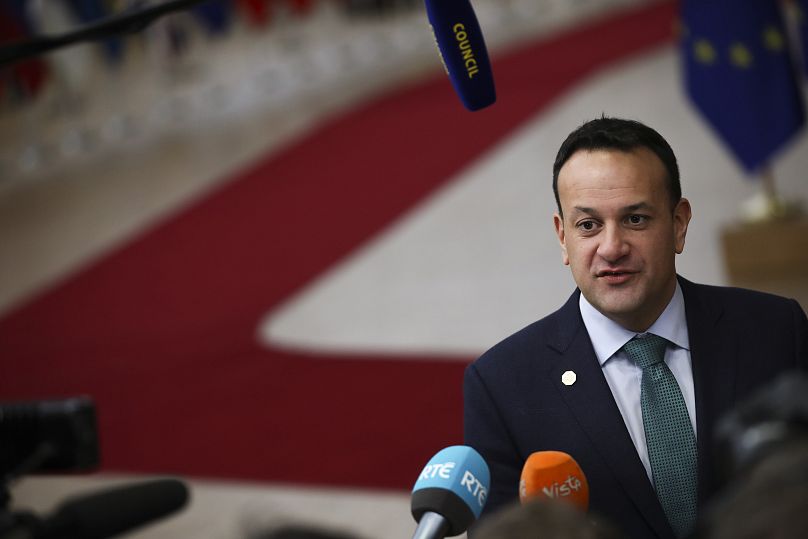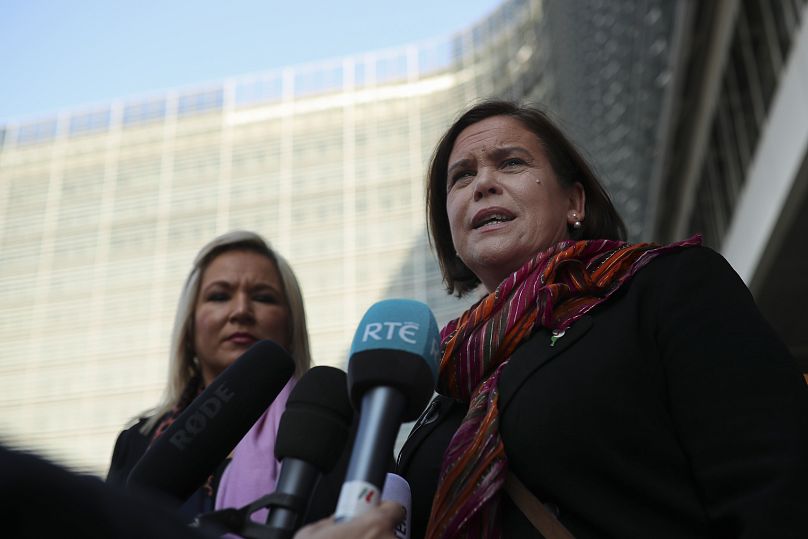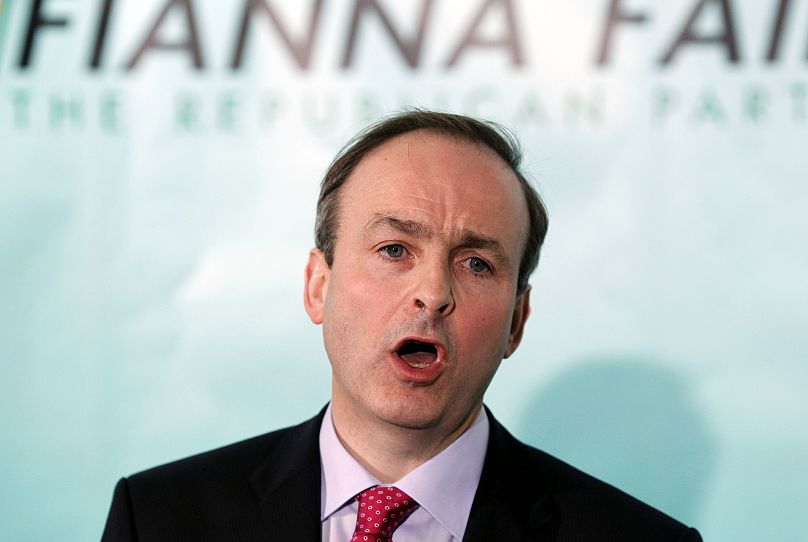Prime Minister Leo Varadkar's election gamble appears to have backfired.
Ireland's SinnFein will try to secure a government in Ireland after early results suggest that the party won the largest share of the vote in a snap election this weekend.
 ADVERTISEMENT
ADVERTISEMENT
 ADVERTISEMENT
ADVERTISEMENT
Prime Minister Leo Varadkar's centrist party, Fine Gael, its centrist rival, Fianna Fail, and the left-wing Sinn Fein party all received around 22% of the vote.
This result indicates a historic change in Irish politics. For decades Fine Gael and Fianna Fáil have alternated power, but now there's a third party to contend with, Sinn Fein.
A coalition appears inevitable, but first there's likely to be weeks of hard political bargaining.
Neither of the two older parties have said they'll go into a coalition with Mary Lou McDonald's Sinn Fein party because of its historic links with the Irish Republican Army.
Sinn Fein is also in a slightly weaker position because it fielded only 42 candidates for the 159 seats available in parliament.
But in a bullish statement, Sinn Fein leader Mary Lou McDonald said the party would now "do everything we can" to try to form a government.
Why is Varadkar fighting for political survival despite a booming economy?
Announcing snap elections earlier this month, Varadkar outlined what he saw as his achievements in power.
“As a nation, we have every reason to be hopeful about the future,″ he said in a Dublin speech. “We’ve modernised our society — marriage equality, women’s rights, real progress in education, welfare and childcare. But, it’s not enough. I know it’s not enough.”
He might be right. Vardkar's election result may seem surprising considering his economic track record. The country's GDP has outperformed the rest of the EU every year since 2014. The labour market is also doing extremely well, with unemployment below 5%.
At 41, Vardakar is Ireland's youngest Taoiseach. He is also the first gay person to hold the post.
Surveys suggest voters backed his diplomatic successes on Brexit that prevented the return of a trade border across the island.
But concerns over housing, pension and healthcare have dominated the campaign, turning the mood against Vardkar's government.
"Varadkar is seen as quite successful internationally but the big problem he has is housing," said Eoin O'Malley, an Associate Professor in political science at Dublin City University.
Rents are increasing exponentially, particularly in the capital, he said, and the government was not seen as tackling the problem.
The statutory retirement age is also due to rise from 66 to 67 from next year and to 68 in 2028, drawing anger from older voters.
What does the Sinn Fein surge in the polls mean?
Sinn Fein may have struck a chord by calling for the retirement age to be brought back to 65 and proposing grants for homeowners.
The former political wing of the Irish Republican Army (IRA), for a long time a pariah in the country's political landscape, has now become one of the main players.
Sinn Fein leader Mary Lou McDonald has become the most popular figure among all the main parties, with approval ratings at 41%.
O'Malley told Euronews that the party's surge in the polls might have more to do with "a process of elimination."
For young people tired of austerity policies, left-wing Sinn Fein embodies radical change much more than the two mainstream parties, he said.
Furthermore, younger generations have no recollection of the violence Sinn Fein was long associated with, he noted.
Sinn Fein is already part of a power-sharing government across the UK border in Northern Ireland (which, like Scotland, voted to remain in the European Union in the 2016 referendum). Its ultimate goal is reunification with the Irish Republic.
Northern Ireland's enforced Brexit has increased calls for a referendum reunification — a so-called unity poll.
The party has ruled out taking part in a coalition government without a commitment to immediately start planning for a reunification referendum by 2025.
But despite its surge in the polls, Sinn Fein is unlikely to lead the next government because it is entering only 42 candidates, whereas 80 seats are needed to form a majority.
Who is Micheál Martin of Fianna Fail?
Micheál Martin, 59, has held various ministerial posts in previous governments between 1997 and 2011.
His Fianna Fail is a "classic centrist party" that has dominated Irish political life for decades, O'Malley told Euronews.
Despite still being at the centre of the Irish political scene, Martin's Fianna Fail may have suffered from their association with the massive financial crisis that hit Ireland from 2008 to 2011.
"Fianna Fail has made a lot of election promises," O'Malley said, but they are "very much like what they were proposing 20 years ago."
Like Fine Gael, Fianna Fail says it would ultimately like to see the unification of the island but that now is not the time.
However, in its election manifesto, Fianna Fail said it would lead a formal study and cross-community consultation that would set out how an Irish government should approach the handling of a future referendum.
What are the potential coalition options?
The exit polls suggest a coalition government is likely.
The "most obvious" coalition option, according to O'Malley, would be an alliance of the two centrist parties, Fianna Fail and Fine Gael, "because they are politically similar."
Yet they have been "implacable enemies historically" and governing together could be seen as posing an "existential threat" to these parties, the expert added.
Another option would be a coalition between Sinn Fein and Fianna Fail.
Fianna Fail, like Fine Gael, so far refuses to form a coalition with Sinn Fein, citing their links with IRA and disagreements over economic policies.
But political pragmatism may force Fianna Fail to rethink its position.
Negotiations for such a coalition could take months, O'Malley said, considering that each party's congress would need to approve coalition terms.
The political scientist added that a scenario similar to Spain, in which elections are called again within a few months in the absence of a coalition deal, couldn't be ruled out.
What are the implications for Europe?
"Most parties in Ireland are pro-EU except for Sinn Fein, which campaigned against EU treaties," O'Malley told Euronews.
He compared the Irish leftwing nationalists to movements such as Syriza in Greece or Podemos in Spain that view the EU as a capitalist club.
Yet even Sinn Fein has tempered its anti-EU position in recent years, the expert added, as Brexit made the Irish public opinion even more pro-EU than before.
Watch the interview to Ben Kelly, journalist at the Independent, in the media player above.













